About Stephen
Stephen Towns (Baltimore, MD) is a painter and fiber artist whose work explores how American history influences contemporary American society. Originally from South Carolina, Towns received a Bachelor of Fine Art in painting from the University of South Carolina.
His work has been exhibited at The Smithsonian’s National Museum of African American History and Culture, Baltimore Museum of Art, Art+ Practice, The David C. Driskell Center, Jack Shainman’s The School Gallery, and The… more
Jump to a project:
Family Quilt
Family Quilt explores the inter-connectivity of familial and ancestral relationships. I am interested in the idea of the importance of one connecting to one’s ancestral roots. Historically, African-American families were torn apart do to the slave trade. African-Americans were prohibited from learning to read or write. Family members were often purchased or sold with no regard for the "family unit." Therefore, there is the question of how does one connect to their ancestral roots if family history has been lost or unrecorded. The collection contains a series of portraits of my family members, both by blood and marriage. Each was personal explorations of my relationship to my family. The shapes and patterns in the painting were loosely based on African patterns, images of structural DNA, and fingerprints.
-
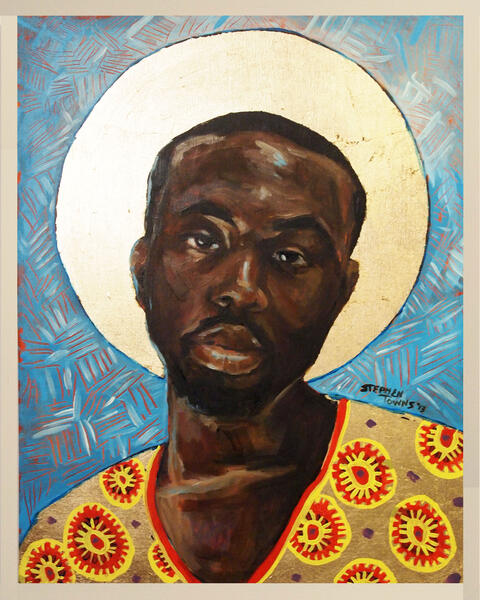 Memories PastOil, Metal Leaf on Panel 11" x 14"
Memories PastOil, Metal Leaf on Panel 11" x 14" -
 Into the Sun-Man as AdamOil, Metal Leaf on Panel 11" x 14"
Into the Sun-Man as AdamOil, Metal Leaf on Panel 11" x 14" -
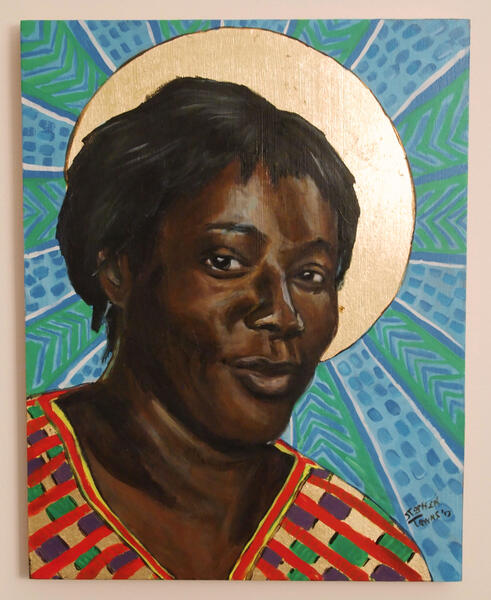 Into the Sun-Woman As EveOil, Metal Leaf on Panel 11" x 14"
Into the Sun-Woman As EveOil, Metal Leaf on Panel 11" x 14" -
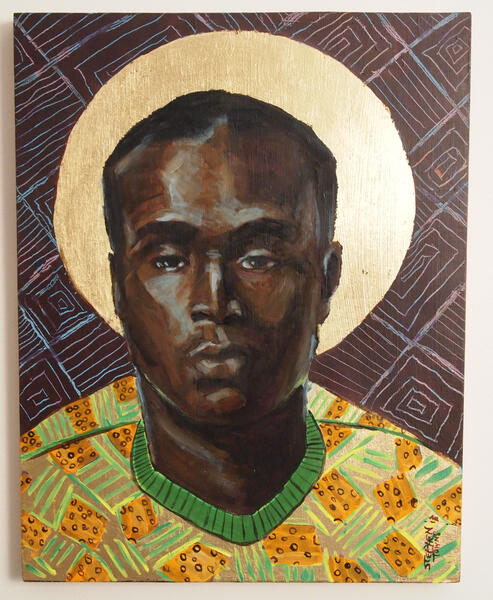 CodedOil, Metal Leaf on Panel 11" x 14"
CodedOil, Metal Leaf on Panel 11" x 14" -
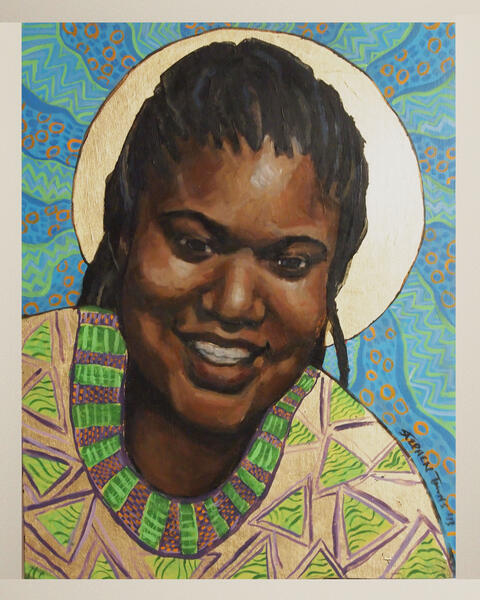 Africa DecodedOil, Metal Leaf on Panel 11" x 14"
Africa DecodedOil, Metal Leaf on Panel 11" x 14" -
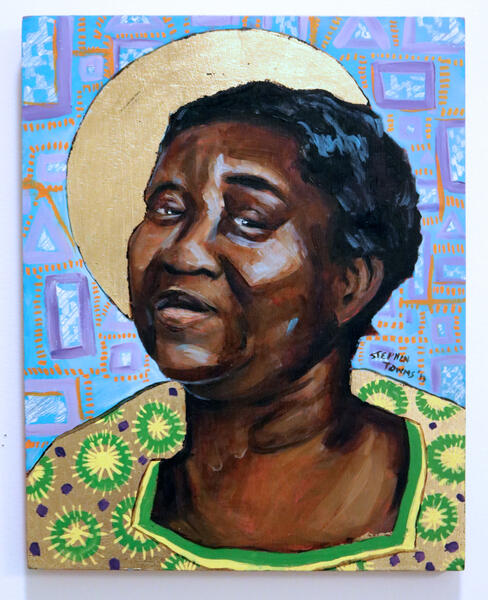 HeredityOil, Metal Leaf on Panel 11" x 14"
HeredityOil, Metal Leaf on Panel 11" x 14"
Brown Bag Test
These works are an exploration of the idea of "colorism" and "brown bag parties" within Black America. The concept of lighter skin tone being "more beautiful" and "desirable" is cross-cultural and exists all over the world. Castes systems developed as a result of this way of thinking. These are a series of mixed-media pieces. The portraits are both acrylic and oil paintings and the backgrounds are made up of paper grocery bags. Each subject's skin tone is being "tested" against the paper bags.
-
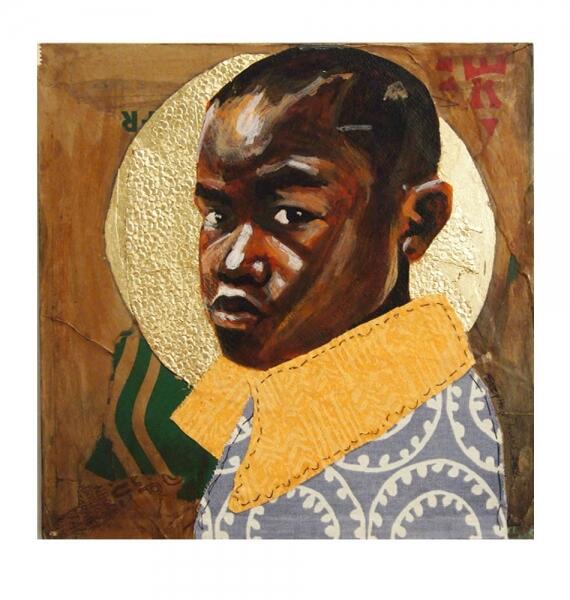 I Am More Than You ThinkBrown Bags, Acrylic Paint, Fabric, Paper on Panel
I Am More Than You ThinkBrown Bags, Acrylic Paint, Fabric, Paper on Panel -
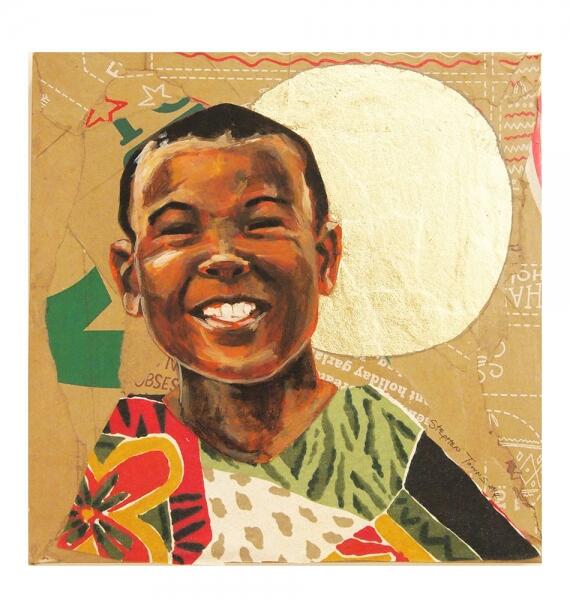 Tears Until JoyBrown Bags, Acrylic Paint, Fabric, Paper on Panel
Tears Until JoyBrown Bags, Acrylic Paint, Fabric, Paper on Panel -
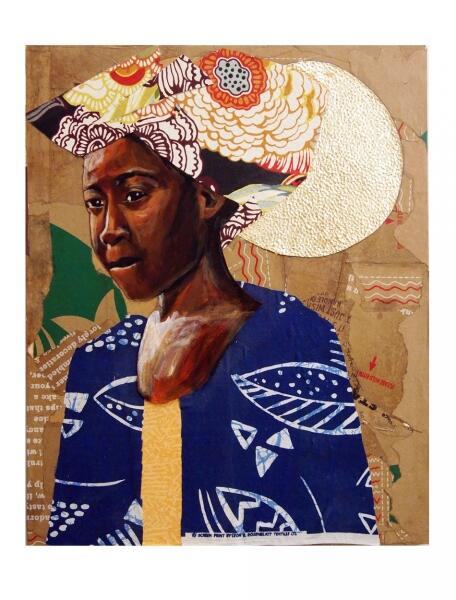 Pattern of ThoughtBrown Bags, Acrylic Paint, Fabric, Paper on Panel
Pattern of ThoughtBrown Bags, Acrylic Paint, Fabric, Paper on Panel -
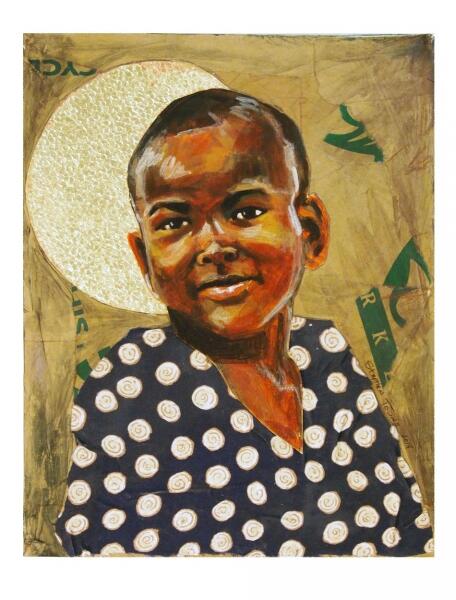 Greater Than, Lesser ThanBrown Bags, Acrylic Paint, Fabric, Paper on Panel
Greater Than, Lesser ThanBrown Bags, Acrylic Paint, Fabric, Paper on Panel -
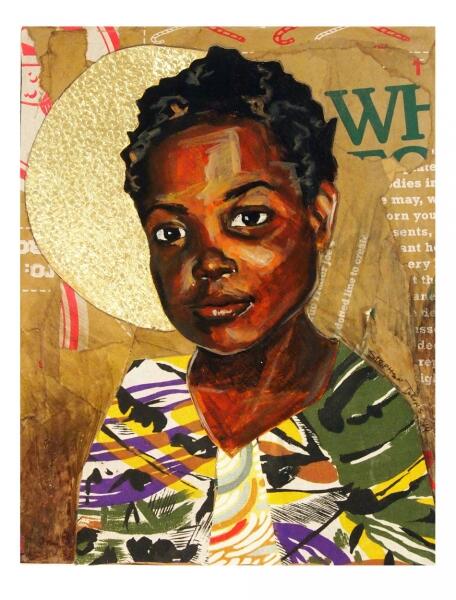 All I HaveBrown Bags, Acrylic Paint, Fabric, Paper on Panel
All I HaveBrown Bags, Acrylic Paint, Fabric, Paper on Panel -
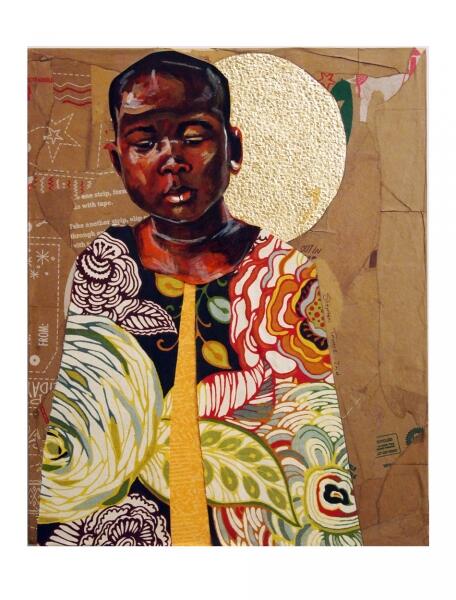 Something From NothingBrown Bags, Acrylic Paint, Fabric, Paper on Panel
Something From NothingBrown Bags, Acrylic Paint, Fabric, Paper on Panel -
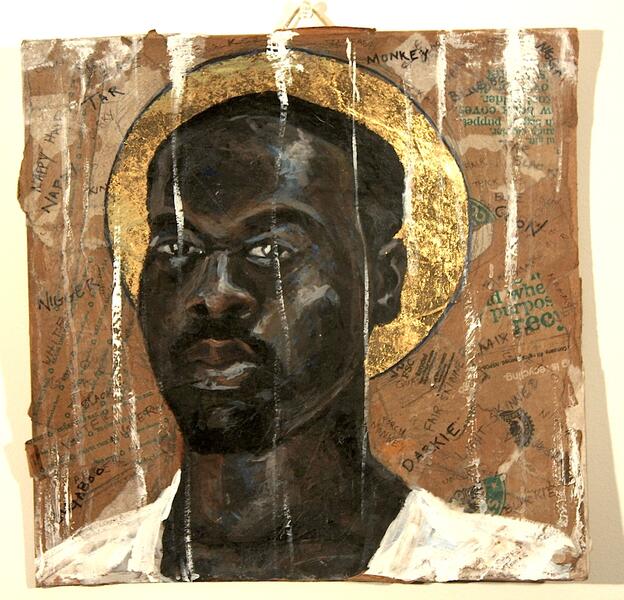 Brown Bag TestOil, Acrylic, Metal Leaf, Paper Bags, on Masonite
Brown Bag TestOil, Acrylic, Metal Leaf, Paper Bags, on Masonite
co|patriot pt 2
co|patriot is a collection of work inspired by Stephen Towns' readings of Harriet Beecher Stowe’s “Uncle Tom’s Cabin”, Solomon Northrup’s “Twelve Years a Slave”, and Harriet Ann Jacob’s “Incidents in the Life of a Slave Girl”. These classic works have helped to inform and broaden Towns’ view of the systemic oppression that has affected contemporary Black Americans. Each work of art examines the relationship Black Americans have had with their country and history, both known and lost.
-
 UnauthorizedAcrylic, Silver Leaf on Panel. Unauthorized was created in response to the 2014 release of Army Regulation 670-1. The document banned a number of hairstyles that negatively impacted black women.
UnauthorizedAcrylic, Silver Leaf on Panel. Unauthorized was created in response to the 2014 release of Army Regulation 670-1. The document banned a number of hairstyles that negatively impacted black women. -
 For the first time I am really proud of my countryAcrylic, Silver Leaf on Panel Black Americans must reconcile with a troubled historical past to maintain a level of patriotism. A past where their ancestors were neither considered citizens nor human beings. This work was inspired by the statement Michelle Obama said in 2008 for which she was heavily criticized.
For the first time I am really proud of my countryAcrylic, Silver Leaf on Panel Black Americans must reconcile with a troubled historical past to maintain a level of patriotism. A past where their ancestors were neither considered citizens nor human beings. This work was inspired by the statement Michelle Obama said in 2008 for which she was heavily criticized. -
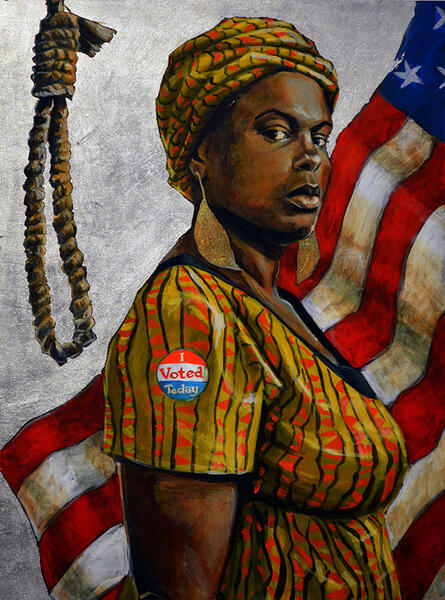 I Wish It Was That EasyAcrylic, Metal Leaf on Panel. There was a long and violent history in the struggle for Black Americans to attain voting rights. Has the right to vote changed America's consciousness?
I Wish It Was That EasyAcrylic, Metal Leaf on Panel. There was a long and violent history in the struggle for Black Americans to attain voting rights. Has the right to vote changed America's consciousness? -
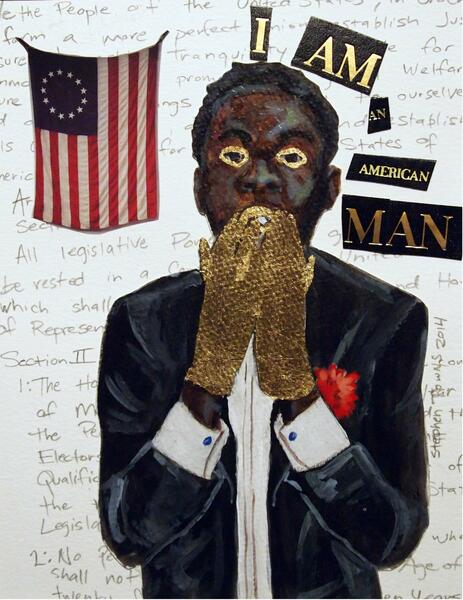 Freedom Papers: US ConstitutionMixed Media. Using the imagery of the minstrel show, the Freedom Papers triptych reveals the hypocrisy of America's freedom documents. These work employ the proverbial principle to "see no evil, hear no evil, speak no evil."
Freedom Papers: US ConstitutionMixed Media. Using the imagery of the minstrel show, the Freedom Papers triptych reveals the hypocrisy of America's freedom documents. These work employ the proverbial principle to "see no evil, hear no evil, speak no evil." -
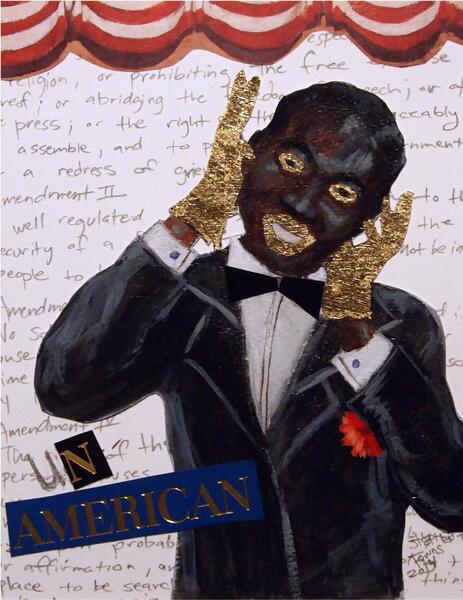 Freedom Papers: Bill of RightsMixed Media. Using the imagery of the minstrel show, the Freedom Papers triptych reveals the hypocrisy of America's freedom documents. These work employ the proverbial principle to "see no evil, hear no evil, speak no evil."
Freedom Papers: Bill of RightsMixed Media. Using the imagery of the minstrel show, the Freedom Papers triptych reveals the hypocrisy of America's freedom documents. These work employ the proverbial principle to "see no evil, hear no evil, speak no evil." -
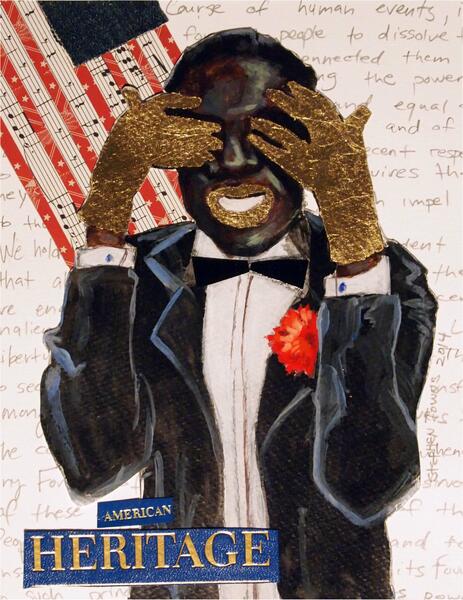 Freedom Papers: Declaration of IndependenceMixed Media. Using the imagery of the minstrel show, the Freedom Papers triptych reveals the hypocrisy of America's freedom documents. These work employ the proverbial principle to "see no evil, hear no evil, speak no evil."
Freedom Papers: Declaration of IndependenceMixed Media. Using the imagery of the minstrel show, the Freedom Papers triptych reveals the hypocrisy of America's freedom documents. These work employ the proverbial principle to "see no evil, hear no evil, speak no evil."
Lift Every Voice and Sing
This series of works were inspired by James Weldon Johnson's poem "Lift Every Voice and Sing" which is often referred to as the "Negro National Anthem."
-
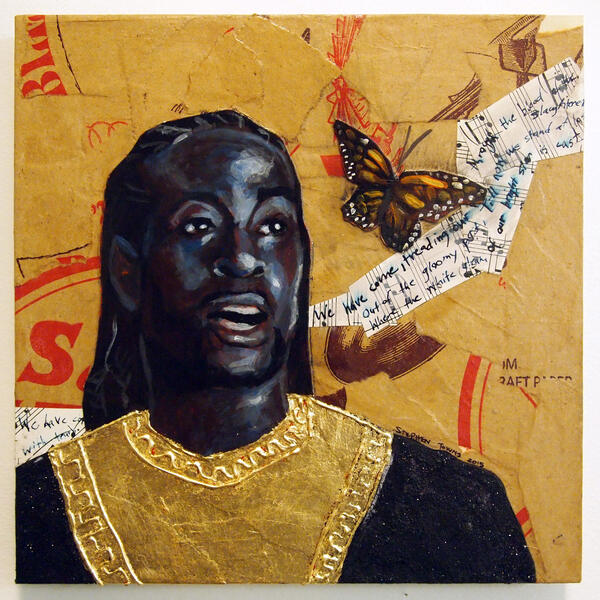 Sing a Song Full of FaithAcrylic, Metal Leaf, Glitter, Paper Bags on Panel 10”x10” 2015
Sing a Song Full of FaithAcrylic, Metal Leaf, Glitter, Paper Bags on Panel 10”x10” 2015 -
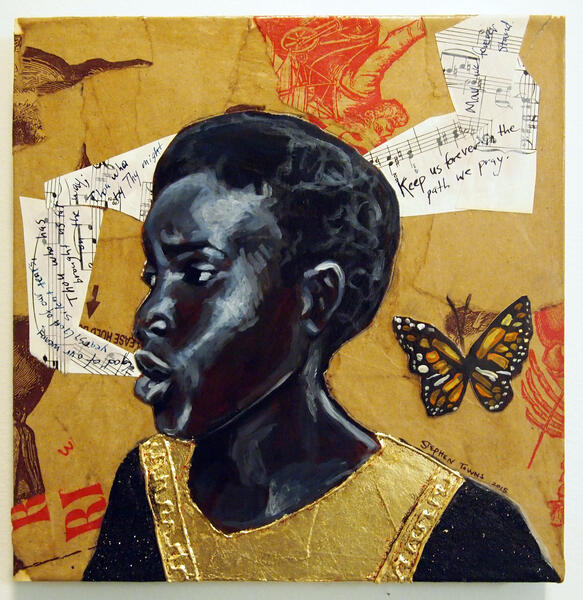 May We Forever StandAcrylic, Metal Leaf, Glitter, Paper Bags on Panel 10”x10” 2015
May We Forever StandAcrylic, Metal Leaf, Glitter, Paper Bags on Panel 10”x10” 2015 -
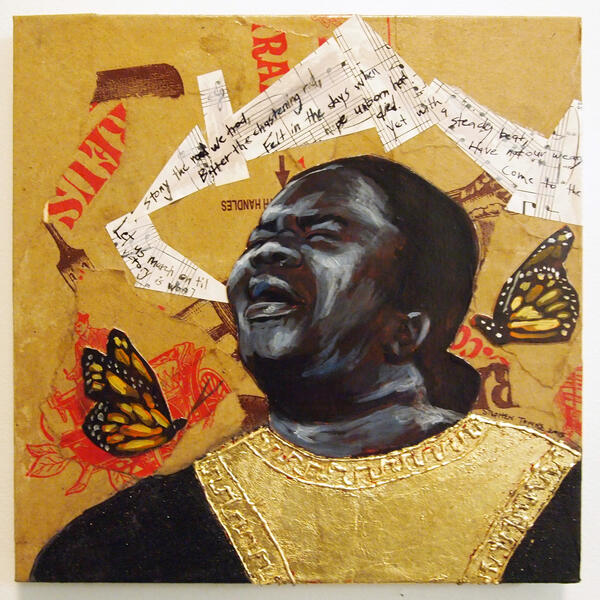 Let Us March OnAcrylic, Metal Leaf, Glitter, Paper Bags on Panel 10”x10” 2015
Let Us March OnAcrylic, Metal Leaf, Glitter, Paper Bags on Panel 10”x10” 2015 -
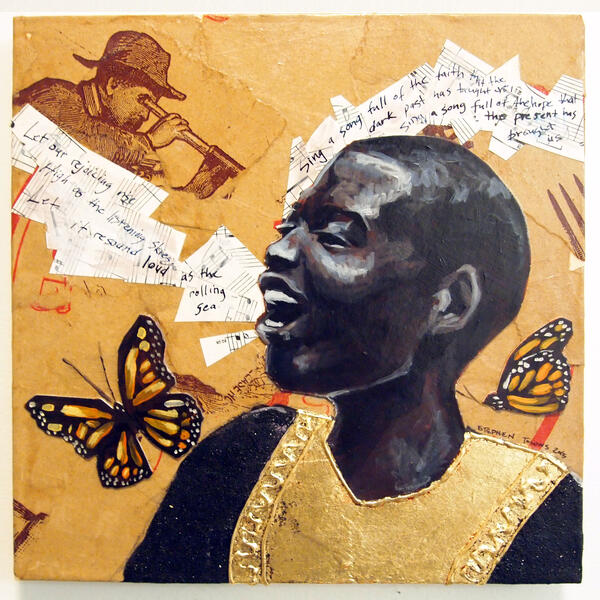 Let our Rejoicing RiseAcrylic, Metal Leaf, Glitter, Paper Bags on Panel 10”x10” 2015
Let our Rejoicing RiseAcrylic, Metal Leaf, Glitter, Paper Bags on Panel 10”x10” 2015 -
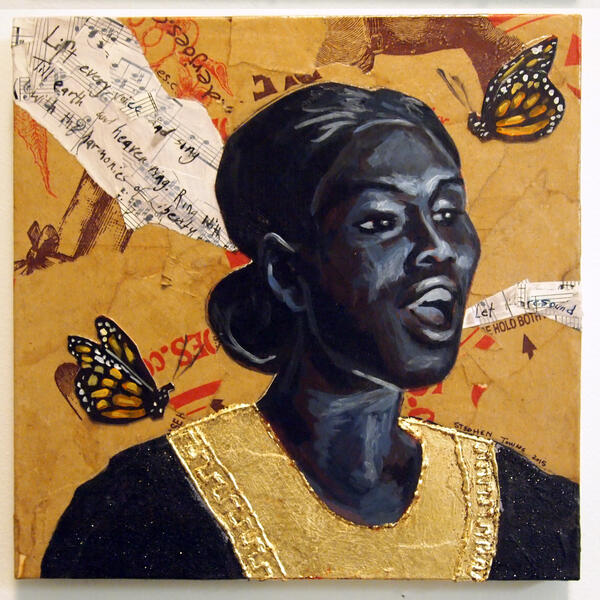 Facing the Rising SunAcrylic, Metal Leaf, Glitter, Paper Bags on Panel 10”x10” 2015
Facing the Rising SunAcrylic, Metal Leaf, Glitter, Paper Bags on Panel 10”x10” 2015 -
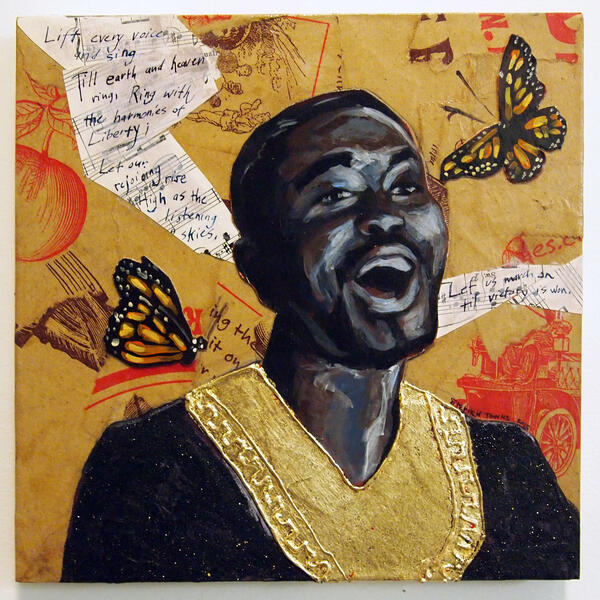 Lift Every Voice and SingAcrylic, Metal Leaf, Glitter, Paper Bags on Panel 10”x10” 2015
Lift Every Voice and SingAcrylic, Metal Leaf, Glitter, Paper Bags on Panel 10”x10” 2015
























